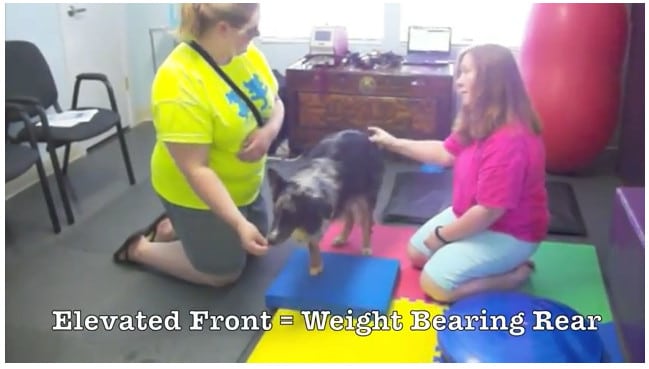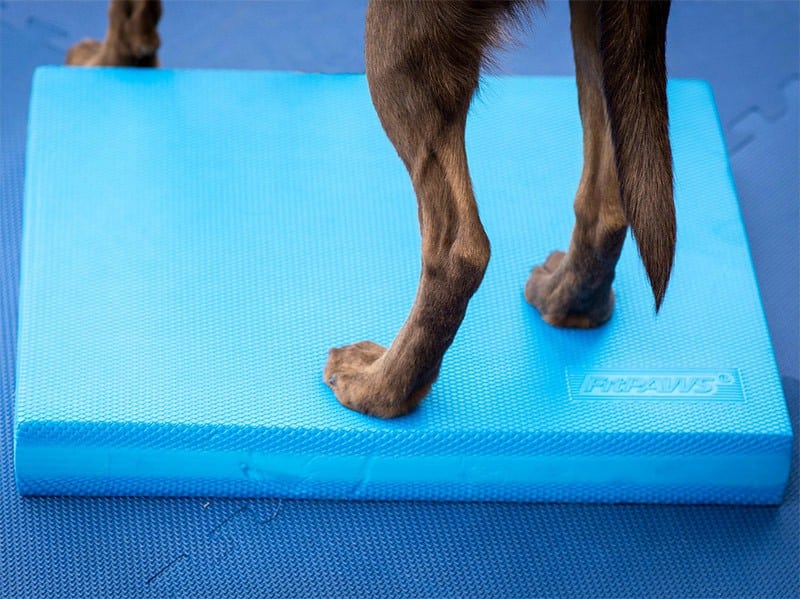Whether your Tripawd is just a few weeks past amputation day or has been an amputee all his life, a FitPAWS Balance Pad can help keep him conditioned and strong.

The FitPAWS Balance Pad is a closed-cell foam pad that doesn’t need inflating. Sized at 15″ x 18.25″ x 2″ it’s Similar to a couch cushion but far easier to clean and incorporate into your daily play session. The Balance Pad is a great place to begin your dog’s new exercise program after your vet gives you the green light.
Domino’s Balance Pad Therapy Session
In this video from our article “How to Exercise Your Tripawd for Fitness and Strength,” you’ll see how front leg amputee Domino exercises under the supervision of Dr. Dicki L. Kennedy of ARCC: Animal Rehab & Conditioning Center in Greenville, South Carolina:
Today we will show you more fun things to do with the Balance Pad. These Tripawd exercise ideas are for dogs, because we aren’t sure how feline Tripawds will do. But if your Tripawd is a cat and you try the exercises, we would love to hear how they did or didn’t like the workout.
Note: Before beginning any exercise program, always get evaluated by a licensed animal rehabilitation therapist. The Tripawds Foundation may even pay for your first rehab visit!
Tripawd Exercise Ideas for the FitPAWS Balance Pad

The following video features a four legged dog but the exercises are still something that most Tripawds should be able to handle. Remember these safety tips when beginning the workout:
Don’t forget to warm up your Tripawd. Go on a short, leashed walk for five to ten minutes before starting this workout.
Go slow and start with one or two reps at a time, each about 15 to 30 seconds max. Remember, Tripawds need extra time and TLC when exercising. The four legged dog in the video has an advantage over three leggers, so please don’t compare your dog to the one in the video.
Keep checking for signs of fatigue. If your dog sits down and doesn’t want to complete the exercise, it’s time for a short break. Try it again after a minute or two and if your Tripawd still doesn’t want to do it, it’s time to stop this exercise for the day.
Other signs of fatigue include lips licking, heavy panting and shaky muscles. If you see any of these pain indicators, stop!
Exercise #1: Front Feet on the Balance Pad
Strengthen your Tripawd’s core muscles by enticing your dog to place both front paws on the Balance Pad.
Stand in front of the pad and point to it, or lure your Tripawd with a treat. The moment those paws hit the pad, reward with the treat.
Keep your dog standing in a symmetrical stance with front feet directly underneath the shoulders and rear leg (stifle) directly under the hips. You want to distribute your dog’s weight as equally as possible among all three limbs.
Exercise #2: Back Up to Balance Pad
This exercise engages core muscles and shifts weight to the back legs. It may be trickier for rear-leg amputees but it’s worth a try.
First ask your dog to walk forward over the Balance Pad. A tasty treat helps!
As soon as the dog walks over the pad, start walking toward your dog, encouraging her to back up onto the pad. As soon as the rear paws hit the pad, reward with a treat.
Again, you want your dog in a symmetrical stance as in Exercise 1, with an equal weight distribution among all three paws.
Exercise #3: Sit to Kickback Stand with Front Legs
This exercise tests a dog’s pelvic limb strength. It’s something that front-leg Tripawds may find challenging but rear-leggers should be able to nail down.
Your goal is to keep your dog’s front feet stationary on the Balance Pad, while the back legs step back into a neutral standing position.
Make sure your dog is in a neutral standing position with front feet under the shoulders and rear leg under the hips.
Exercise #4: Sit to Kickback Stand with Rear Legs
This is the reverse of Exercise #3. Your goal this time is to keep your dog’s front feet in place on the floor, while the hind feet kick back from a square sit position on the Balance Pad, into a neutral standing position.
When your dog stands, the position should be symmetrical with a neutral stance (front feet under the shoulders, rear feet under the hips).
Exercise #5: Hop Forward
Here’s where your Tripawd can do what comes naturally: hop forward!
Place two balance pads on the floor. Your goal is to have your dog move from one pad to the other by bringing the rear feet forward at the same time he hops forward, ending in a sit.
You’ll need to play around with the distance between Balance Pads to find out what works best for your Tripawd, but the further apart they are, the more your dog will be encouraged to hop forward.
Don’t forget to cool down your dog’s body after exercising with a short leashed walk.
Get Your FitPAWS Balance Pad Today!
Recommended Reading
Download the new Tripawds e-book, Loving Life on Three Legs: Canine Fitness and Conditioning for Happy, Healthy Tripawdsfor all the tools you need to help your three-legged hero get fit and stay strong for an injury-free life.

Nice blog guys!
Tracy & Spirit Maggie
Thanks for reading! 🙂
Which exercises are best for a front leg amputee?
Every dog is different. Please consider consulting with a certified canine rehab vet/tech for a professional evaluation and exercises recommended specifically for your Tripawd. Visit a CCRT or CCRP and the Tripawds Foundation can even pay for your first visit. Review these starter exercises and search the blogs and forums for many more helpful tips. Or download Loving Life on Three Legs for even more professional tips and how-to videos.